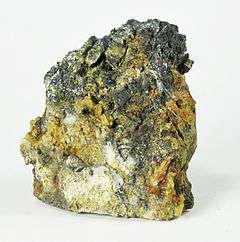Hydrokenoelsmoreite
| Hydrokenoelsmoreite | |
|---|---|
|
White stolzite grains accent rich yellow veins of Hydrokenoelsmoreite microcrystals | |
| General | |
| Category | Oxide minerals |
| Formula (repeating unit) | □2W2O6H2O |
| Strunz classification | 4.DH.15 |
| Crystal system |
3C polytype: Isometric 6R polytype: Trigonal |
| Crystal class |
3C polytype: Hexoctahedral (m3m) 6R polytype: Rhombohedral (3) |
| Identification | |
| Color | White |
| Cleavage | None |
| Fracture | Splintery |
| Tenacity | Brittle |
| Mohs scale hardness | 3 |
| Luster | Adamantine |
| Streak | White |
| References | [1][2][3] |
Hydrokenoelsmoreite is a hydrous tungsten oxide mineral with formula □2W2O6(H2O). Hydrokenoelsmoreite is a colorless to white, translucent isometric mineral. It has a Mohs hardness of 3, exhibits no cleavage and has a splintery fracture. It has a vitreous to adamantine luster. It is optically isotropic with an index of refraction of n = 2.24.
It forms from the oxidation of ferberite within granitic pegmatite dykes and in pegmatitic greisen veins. It has a structure based on a defect pyrochlore lattice (A2B2O6O’).
It was first described for an occurrence in Elsmore Hill, New South Wales, Australia from where it takes its name.
References
- Williams, P.A., Leverett, P., Sharpe, J.L., Colchester, D.M. (2005): Elsmoreite, cubic WO3•0.5H2O, a new mineral species from Elsmore, New South Wales, Australia. Canadian Mineralogist, 43, 1061-1064
- American Mineralogist, volume 91, pages 216-224, 2006.
- Atencio, D., Andrade, M. B., Christy, A. G., Gieré, R., & Kartashov, P. M. (2010). The pyrochlore supergroup of minerals: nomenclature. The Canadian Mineralogist, 48(3), 673-698.doi: 10.3749/canmin.48.3.673
This article is issued from Wikipedia - version of the 11/27/2016. The text is available under the Creative Commons Attribution/Share Alike but additional terms may apply for the media files.
